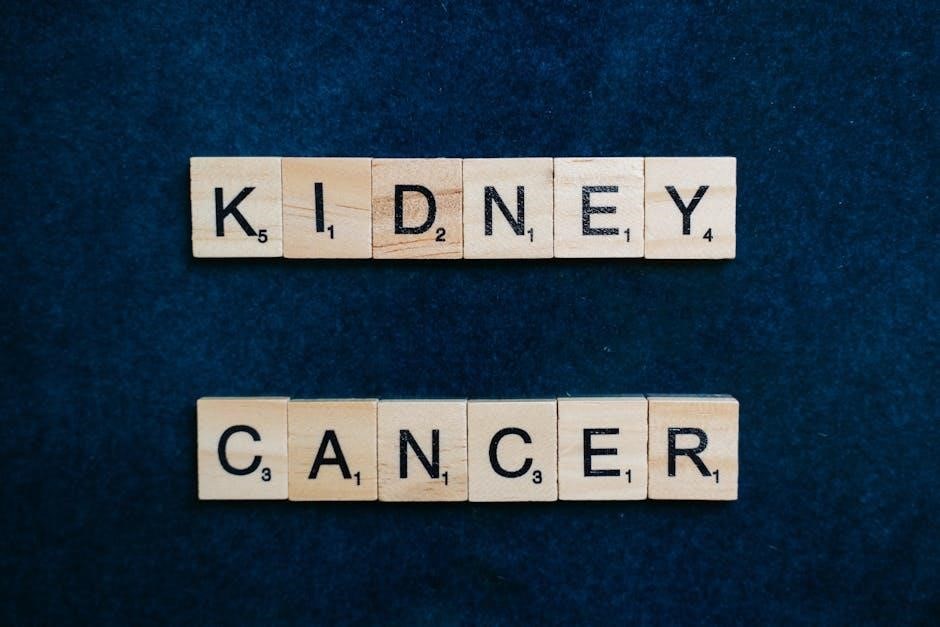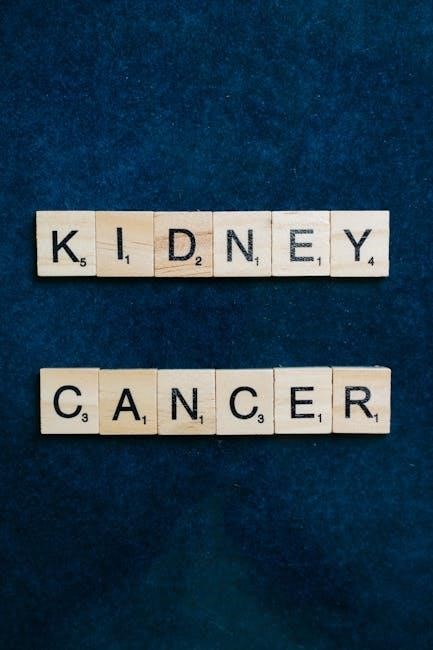Kidney disease requires careful dietary management to slow progression and manage symptoms. A 7-day meal plan helps balance essential nutrients, supporting kidney function and overall health effectively.

Importance of a 7-Day Meal Plan
A 7-day meal plan for kidney disease is essential for managing nutrients like sodium, potassium, and phosphorus, which are critical for kidney health. It helps balance protein intake, ensuring adequate nutrition without overburdening the kidneys. This structured approach prevents dietary overload and supports blood sugar and blood pressure control, reducing the risk of complications. By adhering to a meal plan, individuals can maintain hydration levels and avoid foods that may worsen kidney function. A well-designed plan also incorporates lean proteins and plant-based options, promoting overall wellness. Consistency is key, as it helps stabilize kidney function and improves quality of life for those managing chronic kidney disease (CKD).
Key Nutrients to Limit
Managing kidney disease requires limiting sodium, potassium, phosphorus, and protein to reduce kidney strain and prevent complications. A balanced diet helps maintain optimal nutrient levels.
Sodium
Limiting sodium is crucial for individuals with kidney disease, as excessive intake can worsen blood pressure and strain kidney function. The recommended daily sodium intake for CKD patients is typically 2.3 grams or less. High-sodium foods, such as processed meats, canned goods, and restaurant meals, should be avoided. Instead, opt for fresh, unprocessed foods and season meals with herbs and spices to enhance flavor without adding salt. Reading food labels carefully can help identify low-sodium options. Reducing sodium not only supports kidney health but also helps manage blood pressure, a common comorbidity in CKD patients. Balancing sodium intake is a key component of a kidney-friendly diet, aiding in overall well-being and disease progression management.
Potassium
Managing potassium intake is essential for individuals with kidney disease, as impaired kidney function can lead to dangerous potassium buildup in the blood. High potassium levels can cause serious heart complications. Foods rich in potassium, such as bananas, spinach, and oranges, should be consumed in limited amounts or avoided altogether. Patients are often advised to focus on low-potassium alternatives, such as apples, grapes, and green beans. Portion control is critical, as even moderately high-potassium foods can accumulate to unsafe levels. Regular blood tests are necessary to monitor potassium levels, and a dietitian can help tailor a potassium-friendly meal plan. Balancing potassium intake supports overall health and prevents complications in CKD management.
Phosphorus
Phosphorus management is crucial for individuals with kidney disease, as excessive levels can strain kidney function and lead to complications like bone disease. Foods high in phosphorus, such as dairy products, processed meats, and certain nuts, should be limited. Patients are encouraged to opt for low-phosphorus alternatives, such as fresh vegetables and lean proteins. Portion control is vital, as even small amounts of high-phosphorus foods can add up. Phosphorus-binding medications may be prescribed to help manage levels. Regular monitoring of phosphorus levels through blood tests ensures dietary adjustments are effective. Balancing phosphorus intake is key to maintaining bone health and preventing further kidney damage, making it a critical component of a kidney-friendly 7-day meal plan.
Protein
Managing protein intake is essential for individuals with kidney disease, as excessive protein can increase kidney strain. plant-based proteins like beans, lentils, and egg whites are recommended, while lean meats should be consumed in moderation. High-protein foods, such as red meat and dairy, should be limited to avoid overloading the kidneys. Portion control is key, with a typical serving size being about 3 ounces or the size of a deck of cards. Protein needs vary based on individual health and disease stage, so consulting a dietitian is crucial to ensure a balanced intake. Proper protein management helps prevent waste buildup and supports overall kidney function, making it a vital component of a kidney-friendly diet.

Day 1: Sunday
Start your week with a balanced and kidney-friendly menu. For breakfast, enjoy a low-sodium bell pepper and spinach egg bake, paired with a slice of whole-grain toast. Mid-morning, snack on fresh cucumber slices and a small apple. Lunch features a grilled chicken salad with mixed greens, cherry tomatoes, and a light vinaigrette. In the afternoon, have a small handful of unsalted almonds. Dinner includes baked cod (seasoned with herbs, not salt), steamed green beans, and a side of quinoa. End the day with a refreshing dessert of fresh berries. This meal plan focuses on lean proteins, low-sodium options, and nutrient-rich vegetables to support kidney health and overall well-being.
Day 2: Monday
Begin Monday with a kidney-friendly breakfast of oatmeal topped with fresh blueberries and a drizzle of honey. For a mid-morning snack, enjoy a small serving of baby carrots with a tablespoon of hummus. Lunch features a lean turkey wrap using a low-sodium tortilla, filled with lettuce, cucumber, and mustard. In the afternoon, have a small pear as a snack. Dinner includes grilled shrimp seasoned with lemon and herbs, served alongside mashed cauliflower and steamed asparagus. End the day with a small serving of dark chocolate (at least 70% cocoa). This meal plan emphasizes lean proteins, low-sodium options, and a variety of colorful vegetables to support kidney health and overall nutrition.
Day 3: Tuesday
Start Tuesday with scrambled eggs (2 eggs) paired with a slice of whole-grain toast and a small banana slice. For a mid-morning snack, have 5 almonds. Lunch features a grilled chicken salad with mixed greens, cucumber, and olive oil dressing, served with a small side of whole-grain crackers. In the afternoon, enjoy an apple slice with 1 teaspoon of peanut butter. Dinner includes baked cod (4 oz) with lemon, quinoa (½ cup cooked), and steamed green beans (½ cup). End the day with a small piece of dark chocolate (1 square). This meal plan focuses on lean proteins, whole grains, and balanced nutrients to support kidney health while maintaining flavor and variety.
Day 4: Wednesday
Begin Wednesday with a vegetable omelet (egg whites only) with spinach and mushrooms, served with a slice of whole-grain toast. For a mid-morning snack, have a small pear slice with 1 teaspoon of low-fat cream cheese. Lunch includes 4 oz of low-sodium turkey breast, a small side of mixed greens with olive oil dressing, and ½ cup of cooked quinoa. In the afternoon, enjoy 5 rice cakes with 1 teaspoon of almond butter. Dinner features 4 oz of grilled shrimp, ½ cup of steamed zucchini, and ½ cup of mashed cauliflower. End the day with a small cinnamon apple slice. This balanced meal plan emphasizes lean proteins, fiber-rich vegetables, and controlled sodium intake to support kidney health while offering variety and flavor.
Day 5: Thursday
Start your day with a kidney-friendly breakfast of 1 cup of low-sodium vegetable soup and 1 slice of whole-grain bread. Mid-morning, enjoy a small apple with 1 teaspoon of almond butter. For lunch, have 4 oz of grilled chicken breast, ½ cup of cooked brown rice, and a side of steamed green beans. In the afternoon, snack on 5 baby carrots with 1 tablespoon of hummus. Dinner includes 4 oz of baked cod, ½ cup of mashed sweet potato, and a side salad with olive oil dressing; End the day with a small serving of fresh berries. This meal plan focuses on lean proteins, low-sodium options, and nutrient-rich vegetables to support kidney health while maintaining flavor and variety.

Day 6: Friday
Begin Friday with a nutritious breakfast of 1 cup of oatmeal topped with a sprinkle of cinnamon and 1 small banana. Mid-morning, enjoy ½ cup of cucumber slices with 1 tablespoon of low-fat yogurt dip. For lunch, have 4 oz of sliced turkey breast, 1 small whole-grain pita, and a side of mixed greens salad with olive oil dressing. In the afternoon, snack on ½ cup of fresh pineapple chunks. Dinner features 4 oz of baked salmon, ½ cup of herbed quinoa, and a side of steamed asparagus. End the day with a small pear for dessert. This meal plan emphasizes lean proteins, low-sodium options, and balanced nutrients to support kidney health while offering a variety of flavors and textures to keep meals enjoyable and satisfying.
Day 7: Saturday
Start Saturday with a breakfast of 2 scrambled eggs, 1 slice of whole-grain toast, and ½ cup of fresh berries. For a mid-morning snack, enjoy 1 small apple with 1 teaspoon of almond butter. Lunch includes 4 oz of grilled chicken breast, 1 cup of mixed greens salad with olive oil dressing, and ½ cup of cooked brown rice. In the afternoon, have ½ cup of baby carrots with 1 tablespoon of hummus. Dinner features 4 oz of baked cod, ½ cup of steamed green beans, and ½ cup of roasted sweet potato. End the day with a small orange for dessert; This meal plan focuses on lean proteins, low-sodium options, and balanced nutrients to support kidney health while offering a variety of flavors and textures to keep meals enjoyable and satisfying.
Additional Tips for Managing CKD
Stay hydrated by drinking water as advised by your doctor. Monitor blood sugar and pressure regularly to prevent complications. Avoid smoking to reduce kidney damage risk.
Adopt a balanced diet, exercise regularly, and maintain a healthy weight to support kidney function. Regular check-ups with your healthcare provider are essential for managing CKD effectively.
Staying Hydrated
Proper hydration is crucial for kidney health, as it helps flush out toxins and waste products. However, fluid intake must be balanced, especially for those with advanced CKD. Drinking too much can strain the kidneys, while too little may lead to dehydration. Patients should consult their healthcare provider to determine the right amount of fluid to consume daily. Water is the best choice, and it’s important to drink it between meals rather than with food to avoid overloading the kidneys. Monitoring urine color can help gauge hydration levels—pale yellow indicates proper hydration, while dark yellow suggests the need for more fluids. Staying hydrated supports overall health and kidney function, making it a key component of CKD management.
Monitoring Blood Sugar and Pressure
Regular monitoring of blood sugar and blood pressure is essential for managing kidney disease. High blood pressure can damage kidneys further, while uncontrolled blood sugar levels, especially in diabetic patients, can worsen kidney damage. Patients should aim for a blood pressure target of less than 140/90 mmHg and work with their healthcare provider to maintain stable blood sugar levels. Incorporating potassium-friendly foods and lean proteins into the 7-day meal plan can help support these goals. Daily checks and lifestyle adjustments, such as limiting sodium and exercising moderately, are key to maintaining healthy levels and protecting kidney function. Consistent monitoring ensures better control and reduces the risk of complications.
Avoiding Smoking
Smoking is a significant risk factor for kidney disease progression, as it damages blood vessels and reduces kidney function. Quitting smoking can slow disease progression and improve overall health. Nicotine constricts blood vessels, reducing blood flow to the kidneys, which can worsen damage over time. Incorporating a healthy 7-day meal plan alongside smoking cessation can further support kidney health. The combination of a balanced diet and avoiding smoking helps maintain better blood flow and reduces inflammation. Patients with kidney disease are strongly advised to quit smoking to protect their kidneys and enhance the effectiveness of their dietary changes. Smoking cessation, paired with a kidney-friendly meal plan, promotes long-term health and well-being.

Consulting a Dietitian
Consulting a dietitian is crucial for managing kidney disease through diet. A dietitian specializes in creating personalized meal plans tailored to your specific needs, including your stage of kidney disease, medical history, and lifestyle. They can help you understand which foods to include or avoid, ensuring you meet nutrient requirements while protecting your kidneys. Regular consultations allow for monitoring and adjustments to your diet as your condition evolves. A dietitian’s expertise is invaluable for optimizing your 7-day meal plan, addressing concerns like sodium, potassium, and protein intake, and ensuring you receive essential nutrients. Their guidance can significantly slow disease progression and improve overall health outcomes. Working with a dietitian provides peace of mind and a clear path to maintaining kidney health.
A well-structured 7-day meal plan is essential for managing kidney disease, helping to slow progression and improve overall health. By focusing on nutrient-rich, kidney-friendly foods and limiting harmful substances, individuals with CKD can maintain proper kidney function. This plan provides balanced nutrition, supports energy levels, and reduces the strain on the kidneys. Consistency and adherence to the meal plan are key to long-term health benefits. Consulting a healthcare provider or dietitian ensures the plan is tailored to individual needs, particularly for those in advanced stages of CKD. A kidney-friendly diet not only protects the kidneys but also enhances overall well-being, making it a vital component of managing the disease effectively.